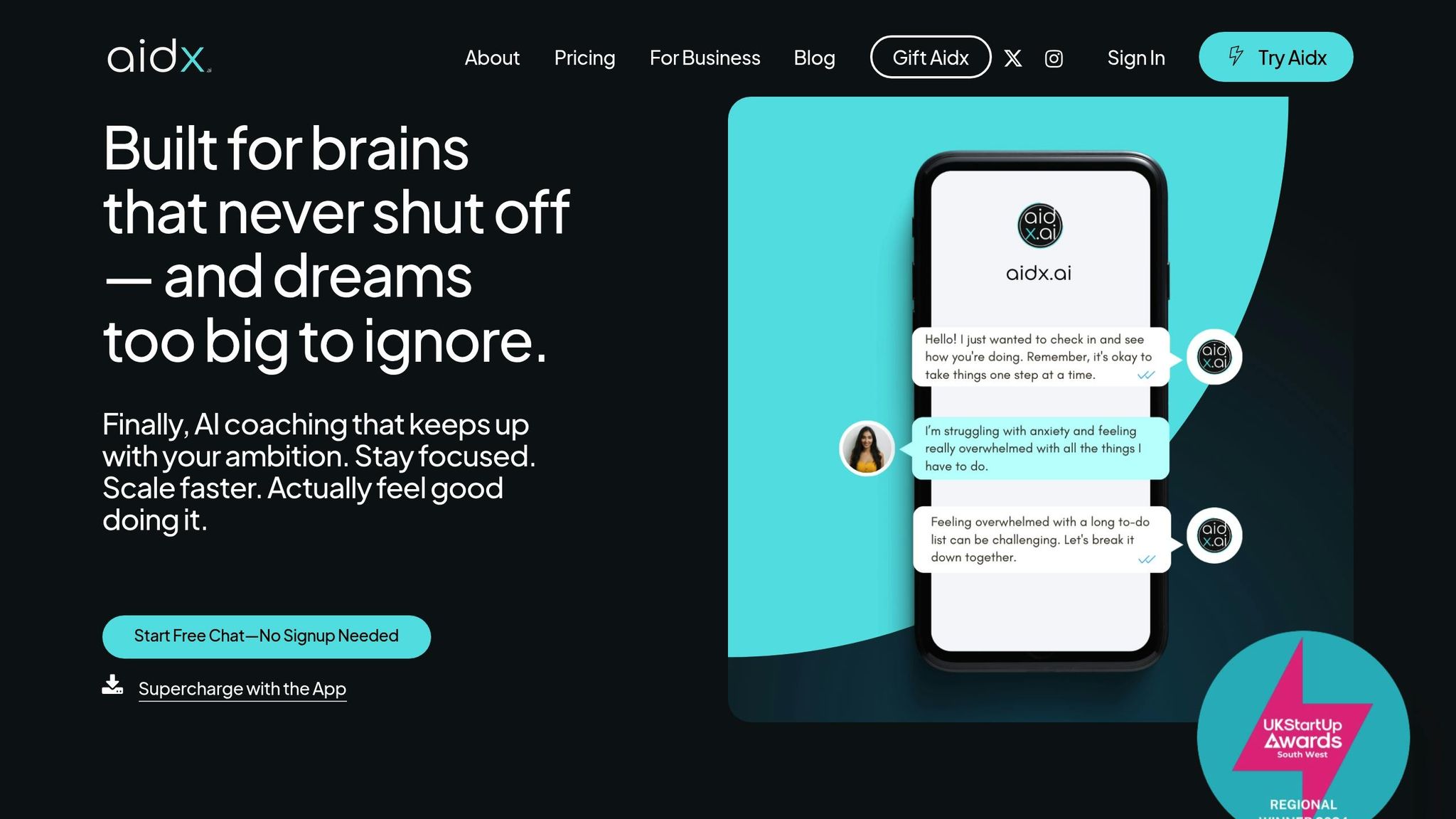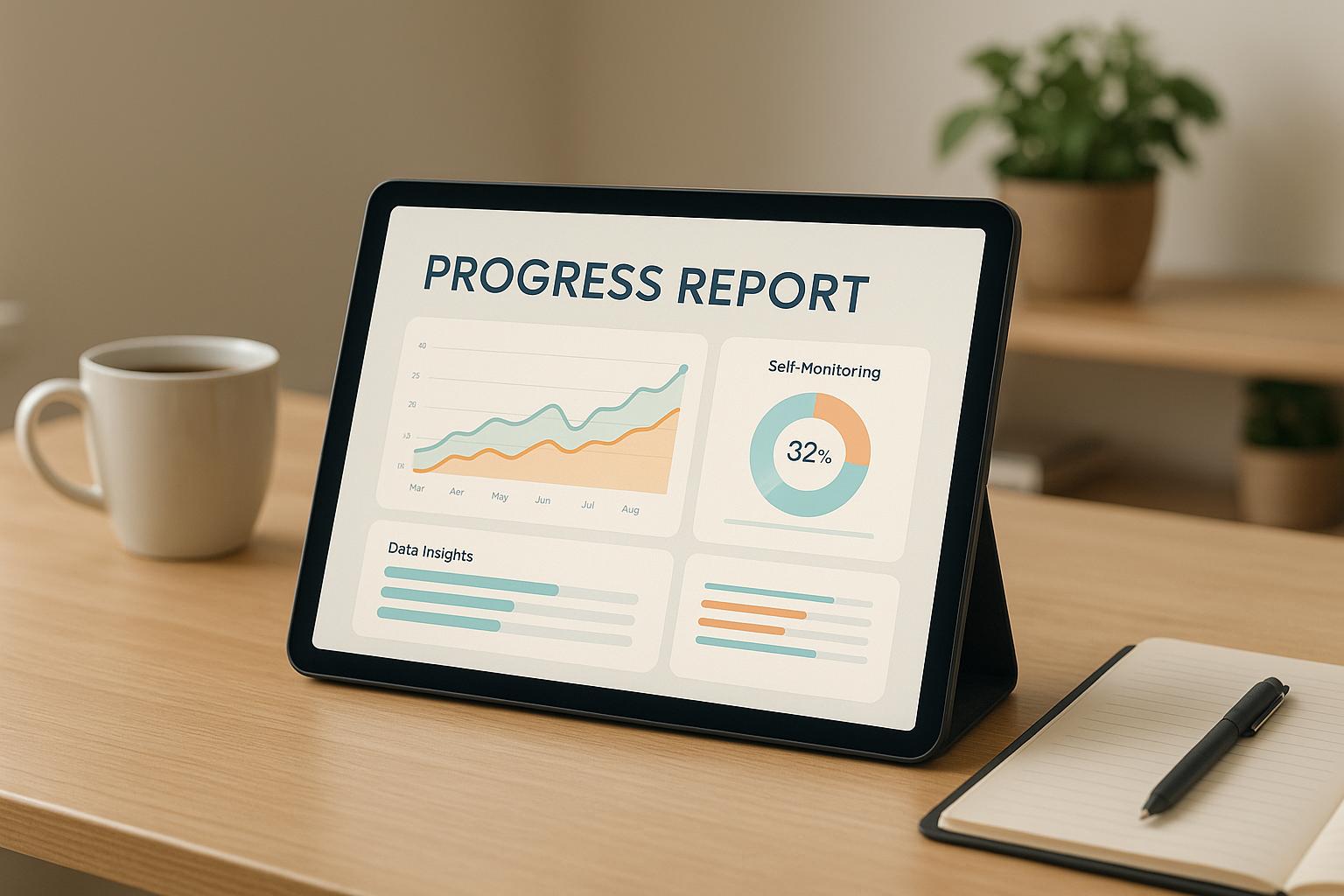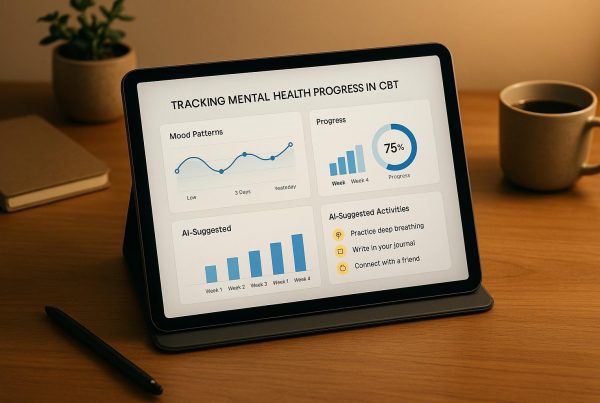AI progress reports turn personal growth into measurable, actionable insights. They analyze your daily behaviors, emotions, and patterns to help you track progress and make real-time adjustments. Unlike journaling or manual goal tracking, AI provides objective, data-driven feedback without relying on your memory or consistency.
Key Benefits:
- Real-Time Feedback: AI tools provide instant suggestions to adjust your mindset or actions on the spot.
- Unbiased Tracking: AI monitors emotional states, stress levels, and performance metrics with precision.
- Pattern Recognition: Detects hidden trends, like stress triggers or productivity dips, that you might miss.
- Motivation Boost: Highlights milestones and celebrates small wins to keep you engaged.
- Ease of Use: Integrates into daily life with minimal effort, offering automated summaries and quick check-ins.
For example, tools like Aidx.ai use advanced techniques (CBT, DBT, ACT, NLP) to track emotional and behavioral data, offering tailored insights to accelerate growth. They also prioritize privacy with end-to-end encryption and user control over data. Plans start at $24/month, making professional-grade support accessible.
AI progress reports simplify self-monitoring, making it easier to stay consistent, motivated, and aware of your growth journey.
Lifestack Review: Best AI Tracker & Health App?
How AI Progress Reports Work
AI progress reports turn everyday interactions into clear, objective insights, helping you track and enhance your personal growth. This three-step process transforms your daily behaviors into actionable feedback, offering a level of precision that traditional tracking methods often lack.
Collecting and Analyzing Data
AI systems begin by gathering data from various points of interaction throughout your day. This includes voice commands, text messages, self-reported updates, and observed behavioral patterns. Unlike manual journaling, where details can be forgotten or filtered, AI captures these moments objectively and without bias.
This seamless process tracks metrics like confidence levels, stress triggers, anxiety patterns, and performance indicators across different situations and timeframes. It’s a comprehensive yet unobtrusive system that ensures no detail is overlooked. For example, one company utilized facial detection and sentiment analysis to monitor stress levels, providing targeted recommendations over three months [4].
Once the data is collected, AI analyzes it to uncover emotional, mental, and behavioral trends. These insights are powered by advanced pattern recognition, which goes beyond what manual methods can achieve.
Pattern Recognition and Insights
After data collection, AI dives into identifying patterns and connections that might otherwise go unnoticed. This step transforms raw data into meaningful insights that can drive real change.
AI can detect subtle language cues and emotional signals [5]. It identifies moments when communication might hide deeper feelings, offering a clearer view of your emotional state and behavioral triggers. For example, it might find links between stress levels and productivity or notice that your confidence dips on Monday mornings but improves after exercise.
One deep learning model, tested on a dataset of 32,000 tasks, achieved a 93% accuracy rate – outperforming earlier models by 7% [3]. This level of precision allows AI to provide reliable feedback on your progress and behavioral trends. Additionally, AI excels at spotting anomalies – those moments when your behavior or emotional state significantly deviates from the norm. These outliers often highlight critical learning opportunities or serve as early warnings that prompt timely action.
Real-Time Feedback and Adaptation
What sets AI progress reports apart is their ability to deliver instant, personalized feedback that evolves with your needs. Unlike traditional self-monitoring, which relies on periodic reflections, AI evaluates your current state and offers real-time suggestions.
This immediate feedback can lead to measurable improvements. For instance, Coursera saw a 20% increase in course completion rates by using AI to analyze learning behaviors and provide tailored recommendations [7].
AI coaching systems continuously monitor your interactions, offering insights on the spot. For example, they might suggest breathing exercises during stressful moments or cognitive techniques to counter negative self-talk [6]. Over time, as the AI learns your unique patterns and goals, its recommendations become even more precise, creating a personalized feedback loop that drives meaningful change. This real-time adaptability ensures that the guidance you receive is always relevant, actively supporting your growth moment by moment.
Benefits of AI Progress Reports for Personal Growth
AI progress reports are changing the way we approach personal growth by offering insights that traditional methods often overlook. These systems bring a level of precision and consistency that not only speeds up development but also keeps you motivated along the way.
Objective and Consistent Monitoring
When it comes to personal development, we’re often our own worst critics – or, sometimes, our biggest cheerleaders. This natural bias makes it hard to evaluate progress accurately. AI steps in to solve this by providing unbiased, data-driven assessments. Unlike traditional self-reflection, which can be clouded by emotions, AI delivers clear, impartial insights [8]. For instance, it can detect patterns in how you react to situations and suggest alternative behaviors that might work better for you [2].
Consistency is another area where AI shines. Automated tools ensure that your progress is tracked and reported regularly, removing the guesswork [6]. One example comes from a mid-sized tech company where employees used AI-powered facial analysis tools to manage stress. Over three months, these tools helped create personalized well-being plans based on objective stress indicators, leading to noticeable improvements in productivity [4]. Beyond just tracking, AI can uncover subtle patterns that reveal areas for growth you might not have noticed.
Finding Hidden Growth Opportunities
AI has an incredible ability to identify opportunities for improvement that traditional methods often miss. By analyzing personal data – like journaling entries or behavioral patterns – it can spot trends and anomalies that humans might overlook. For example, it can link your emotional states to specific activities or social interactions, helping you understand triggers for emotional responses [8]. It can even analyze your communication habits, offering suggestions to improve social skills, such as diversifying conversation topics or enhancing engagement strategies to strengthen relationships [9].
Take Miguel Thorpe, a university student, as an example. By integrating Personal AI into his daily routine, he was able to optimize his learning and accelerate personal growth [9]. Research backs this up: a randomized controlled trial involving 188 participants showed that using AI to connect with future selves reduced anxiety, boosted motivation, and strengthened long-term goal alignment [10]. Platforms like Aidx.ai take this a step further by tracking emotional states, confidence, stress, and overall performance metrics. This comprehensive tracking not only highlights opportunities for growth but also provides concrete evidence of improvement, making personal development feel more tangible and rewarding.
Celebrating Milestones and Maintaining Motivation
AI doesn’t just help you grow – it ensures you stay motivated by celebrating your wins, big or small. One of the hardest parts of personal development is staying committed, especially when progress feels slow. AI progress reports make this easier by highlighting achievements and reinforcing positive behaviors, which helps build momentum.
Recognition is key to staying motivated. Studies show that people who feel acknowledged are more likely to stick with their goals, while those who don’t often give up [11]. AI excels at capturing and celebrating every milestone, whether it’s mastering a new skill or stepping into a leadership role. These celebrations not only reflect genuine progress but also encourage you to keep going [11]. For example, AI can track improvements in your emotional well-being or communication skills, providing encouragement every step of the way.
"Organizations that focus on personal development plans see a significant improvement in employee mental health and well-being, reducing workplace stress and increasing overall job satisfaction." – McKinsey & Company [12]
AI-driven systems also adapt goals in real time, ensuring they remain challenging yet achievable. In workplace settings, this might mean tailoring sales targets or productivity goals to keep employees engaged and performing at their best. By identifying both strengths and areas for improvement, AI provides targeted support that enhances overall performance [13]. And with features like gamified progress reports, personal development becomes an engaging and enjoyable experience, helping you stay connected to your growth journey – even when the going gets tough.
sbb-itb-d5e73b4
Adding AI Progress Reports to Your Daily Routine
Incorporating AI progress reports into your day-to-day life can be a game-changer. The secret lies in starting with a clear plan, picking the right tools, and building a system that works with your schedule. When AI fits naturally into your routine, it provides valuable insights to help you grow consistently and stay on track.
Setting Clear Goals and Metrics
Before diving into any AI tool, take the time to define your goals clearly. The best way to do this is by setting SMART goals – specific, measurable, achievable, relevant, and time-bound. For instance, instead of vaguely aiming to "be less stressed", you could set a goal like: "Reduce daily stress levels by 30% within two months, as tracked through evening mood check-ins."
Breaking these goals into smaller, actionable tasks makes it easier to monitor progress. AI tools can help refine these objectives by analyzing your habits and suggesting realistic targets. Whether it’s reducing stress, improving focus, or building resilience, AI simplifies tracking and keeps you focused on what matters.
"AI tools, through their ability to analyze vast amounts of data, offer insights and strategies tailored to individuals. Imagine a world where your growth plan is as unique as your fingerprint, where every tool adapts to you in real-time. That’s the power of AI in personal growth." [14]
Take Sarah, for example – a busy professional struggling to balance her work and health. She turned to an AI-powered fitness app that created personalized workout plans based on her fitness level. By following these tailored recommendations, Sarah achieved noticeable health improvements over time [14].
Using AI Tools Like Aidx.ai

Once your goals are set, the next step is choosing an AI tool that aligns with your needs. Aidx.ai is a great option, offering features like voice interactions, goal tracking, and progress feedback – all in one platform.
You can engage with Aidx.ai during a commute, morning walk, or while winding down in the evening. Its built-in planner lets you set goals, create reminders, and manage to-dos, while its notification system gently nudges you with updates via push notifications, Telegram, or email [15].
- Starter Plan: Free, with limited conversations.
- Elevate Plan: $24/month, offering unlimited chat, voice interactions, check-ins, and full access to the planning system [15].
Psychologists have praised Aidx.ai for its effectiveness. Cleo Brooks, for instance, shared: "I would recommend Aidx to anyone, and I can see how it could be a great tool and addition to the experience my own clients could have." [15]
What makes Aidx.ai stand out is its ability to track emotional states, confidence levels, stress, anxiety, and performance metrics. By analyzing this data, the tool identifies patterns in your behavior and thinking, providing actionable insights. It uses evidence-based techniques from CBT, DBT, ACT, and NLP to guide you toward meaningful changes. Aidx.ai doesn’t just track your progress – it remembers your journey and helps you see tangible improvement over time.
Reviewing and Acting on Insights
Defining goals and using the right tools is only part of the equation. Turning AI-generated insights into action is where the real growth happens. Research suggests that engaging with AI tools for just 10 minutes, twice a week, strikes the perfect balance between effectiveness and manageability [1].
AI often highlights patterns you might overlook. For example, it might reveal that your stress peaks on Tuesday afternoons or that you’re most productive after a morning workout. These insights are only valuable if you act on them. If the data shows your mood improves after social interactions, for instance, you could schedule coffee chats or team collaborations during low-energy times [16] [17].
Make it a habit to review your AI reports regularly and adjust your actions based on the findings. This might mean tweaking your morning routine, setting better boundaries at work, or trying out new coping strategies suggested by the AI.
The key is blending AI’s analytical power with your own intuition. While AI can spot trends and measure progress, you know what feels right for your life. By combining data-driven insights with your personal judgment, you can ensure that AI remains a helpful tool – one that supports your decisions without taking over.
Privacy and Security in AI Self-Monitoring
Sharing your personal thoughts, emotions, and behavioral patterns with AI tools means entrusting them with highly sensitive information. Protecting this data is crucial – not just for your privacy but also for your peace of mind. To make informed decisions about which AI platforms to use for personal development, it’s essential to understand how they safeguard your data.
Here’s a striking fact: only 27% of consumers feel they understand how companies use their personal data [20]. This lack of clarity becomes even more concerning when AI tools analyze intimate details like your emotional states and habits. Thankfully, some platforms are taking steps to address these concerns, focusing on encryption, user control, and ethical practices.
End-to-End Encryption
End-to-end encryption is like a digital lockbox for your data. It ensures that any information you share – whether it’s a progress update or an emotional check-in – gets scrambled into an unreadable format as soon as it leaves your device. Only the intended recipient, equipped with the right decryption keys, can access it.
Take Aidx.ai, for example. The platform uses end-to-end encryption alongside regular key updates and minimal data collection to ensure your information stays private. Everything from your goal-setting sessions to emotional reflections is securely encrypted and stored in their Supabase database [22].
They go a step further with key rotation policies and secure key management systems. By regularly updating encryption keys and storing them safely, Aidx.ai significantly reduces the chances of unauthorized access.
User Control Over Data
Privacy isn’t just about keeping data safe – it’s also about giving you control over it. The most secure AI platforms let you decide what data is collected, how it’s used, and when it should be deleted. This is especially important for self-monitoring tools that track your emotional and behavioral patterns over time.
Aidx.ai puts you in charge. You can delete your personal data anytime through the chat interface or account settings [22]. For even more privacy, Incognito mode ensures your sessions are automatically deleted after 30 minutes.
The platform also limits data collection to the essentials. For example, it only collects email addresses for authentication (using magic links or passwords) and uses cookies solely for necessary functions like managing sessions [22]. There’s no hidden tracking or unnecessary data harvesting – giving you the autonomy to manage your progress without worrying about invasive practices.
This approach aligns with broader consumer preferences. Studies show that 80% to 90% of users opt out of data tracking when given the choice [21]. Jennifer King, a privacy and data policy fellow at Stanford University, sums it up well:
"When I’m browsing online, my data should not be collected unless or until I make some affirmative choice, like signing up for the service or creating an account. And even then, my data shouldn’t be considered public unless I’ve agreed to share it." [21]
Ethical AI Practices
For any AI tool to be truly trustworthy, it must adhere to ethical principles. This means being transparent about how the system works, taking responsibility for automated decisions, and respecting user rights at every step.
Aidx.ai follows strict data protection standards, including GDPR compliance, and refrains from reviewing user data unless legally required. The platform is upfront about its data practices, helping users understand how their information is used to enhance their experience.
To ensure fairness and security, Aidx.ai conducts regular audits for bias, uses Role-Based Access Control (RBAC) to limit access, and ensures its APIs meet rigorous security standards [19]. These measures are especially critical as regulations like GDPR and CCPA impose heavy penalties for mishandling personal data [18].
When evaluating AI self-monitoring tools, prioritize platforms that are transparent about how their systems operate, what influences their decisions, and where their limitations lie [20]. The best platforms often include advanced privacy technologies, like differential privacy and federated learning, to deliver personalized insights without exposing individual data unnecessarily.
Conclusion: Using AI to Improve Self-Monitoring
AI progress reports transform emotions and actions into measurable data, offering a way to track personal growth that goes beyond what traditional methods can achieve.
By objectively analyzing data, AI uncovers patterns that might escape conventional self-reflection. It identifies trends in emotional states, productivity, and behavior, helping to build a clearer picture of personal growth. This data-driven approach doesn’t just monitor – it actively supports progress, offering tangible proof of improvement over time.
A great example of this is Aidx.ai and its Adaptive Therapeutic Intelligence (ATI) System™. This system not only tracks progress but also guides users with proven techniques from CBT, DBT, ACT, and NLP. Privacy is a top priority, with end-to-end encryption and compliance with GDPR standards ensuring user data stays secure.
The platform fosters a supportive environment that celebrates achievements while keeping users motivated. As psychologist Vera Martins shared:
"I still can’t believe the very human(e) and warm dialogue I was able to have with Aidx. Thank you for your lovely help, Aidx!" [23]
This kind of interaction highlights the potential of AI-driven self-monitoring tools to make personal development more accessible. With costs reduced by 80% compared to traditional therapy, platforms like Aidx.ai open the door to professional-grade support. For instance, the Elevate plan, priced at $24/month, offers unlimited chat, voice conversations, built-in planning tools, and detailed progress tracking – available whenever you need it.
FAQs
How does AI protect my privacy and keep my personal data secure when generating progress reports?
AI takes your privacy seriously and works to secure your personal data through advanced strategies. One key method is data encryption, which protects your information both during transmission and while it’s stored, ensuring that unauthorized access is blocked. Additionally, AI systems adhere to strict data minimization principles, meaning they only collect the bare minimum of information needed to function effectively and deliver insights.
Many AI platforms also align with privacy laws like GDPR, ensuring your data is managed responsibly and always with your consent. To go a step further, some systems incorporate privacy-enhancing technologies, such as differential privacy, which keep your data confidential while still allowing for valuable analysis. With built-in transparency tools, you have control over your data preferences, reinforcing both trust and accountability.
How do AI progress reports provide more accurate and actionable feedback than traditional self-monitoring methods?
AI progress reports provide instant, data-based insights that surpass the limitations of traditional self-monitoring methods. Unlike manual tracking, which can often be influenced by personal bias or subjectivity, AI processes vast amounts of data to deliver customized feedback aligned with your individual habits and goals. This approach ensures a higher level of accuracy while minimizing the risk of human error.
Beyond just numbers, AI can identify patterns in areas like emotional states, confidence levels, and performance metrics, offering practical suggestions to help you improve. Plus, it delivers immediate feedback, allowing you to tweak your approach on the spot. This combination of precision and responsiveness makes AI a valuable tool for driving meaningful personal growth.
How does Aidx.ai use AI to analyze emotions and behaviors for personal growth?
Aidx.ai uses its Adaptive Therapeutic Intelligence (ATI) System™ to bring together proven methods like Cognitive Behavioral Therapy (CBT), Dialectical Behavior Therapy (DBT), and Neuro-Linguistic Programming (NLP). This system evaluates emotional and behavioral data, adjusting in real-time to your feelings, objectives, and past interactions. The result? A deeply tailored coaching and therapy experience designed just for you.
By spotting patterns in your emotions and behaviors, Aidx.ai delivers practical insights and immediate feedback. These tools not only help you track your progress but also encourage meaningful changes. With features like goal-setting and self-monitoring, it keeps you on track, supporting personal growth and helping you move forward on your journey.



